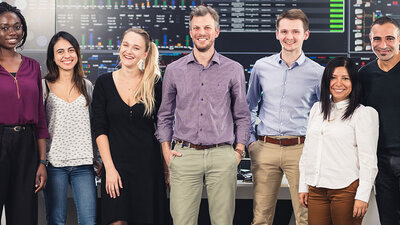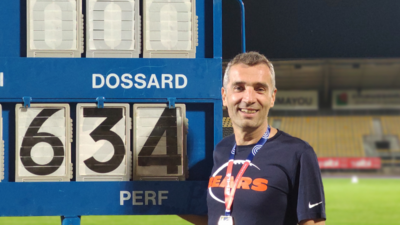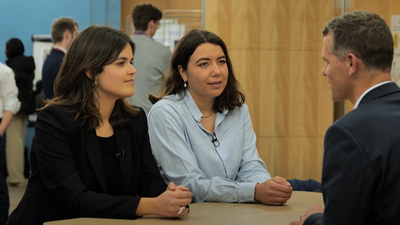How does sport influence professional life? Read the story of Baptiste Amar, former Olympic athlete
Published on July 11, 2024
4 minutes

Air Liquide is a great team with many talents. After meeting Elys Lai, a free diver from Singapore, and Stéphane Pusiol, a seven-time French long jump champion, we continue our series of portraits of employees with a passion for sport. Here we meet Baptiste Amar, a former professional ice hockey player. Now in charge of MTO (Make To Order) projects in France, he tells us about his extraordinary career and his relationship with sport.
Ice hockey is considered to be the "fastest team sport in the world". Baptiste Amar began playing this sport at the age of six, an age when most children are learning to read. A very young start, which can be explained by the technical difficulty that characterizes this sport, which requires mastery of skating, stick handling and good physical condition. Despite playing many other sports in Gap, the town where he grew up in the Hautes-Alpes region of France, hockey was always his favorite. “I hadn’t planned to become a professional player but I wanted to play hockey for as long as possible. That’s what I focused on when I found a university which would allow me to play sports while studying,” Baptiste explains.
At the age of 18, he was recruited by the Lyon Hockey Club and began his career as a professional sportsman, while studying for an engineering degree in the city at INSA. He then spent two years in the United States, at a university near Boston (Massachusetts), where he studied and perfected his skills in a country in which ice hockey is a national institution. Later, he moved to Sweden, another great hockey nation, where he played for a year with the ice hockey club Rögle BK.
In 1999, he joined the French team and had the honor of representing his country at the Olympic Games in Salt Lake City in 2002. “It was extraordinary. Meeting all the athletes and soaking up the atmosphere of the Olympic Village was a unique experience.” His fondest memory? “There’s no one defining moment, but what really stands out for me is transcending my limits and working with my team-mates to achieve our goals.”
Baptiste stopped playing hockey professionally in 2014 but sport continues to play an important role in his life. His involvement in sport has also instilled in him a sense of commitment, an appetite for new challenges and an understanding of who he is and what motivates him. This knowledge was particularly helpful when he had to change careers.
Looking back on his extraordinary career, he says: “I was lucky enough to have a first career which was a genuine passion. When a professional athlete has to give up high-level sport, it’s a bit like a “bereavement”; I’m very proud to have been able to prepare for that moment and make a success of my transition. I love my current engineering role at Air Liquide. I’ve never woken up feeling unhappy about going to work. I see difficulties in making progress with my projects as challenges that motivate and encourage me, because they remind me of ice hockey tournaments, in a way. I like to see things through to the end.”
His next challenge? “Continuing to enjoy outdoor sports into my old age. So I pay attention to the intensity of my sessions and the aches and pains from my professional playing days. High-level athletes’ bodies tend to show signs of wear and tear more quickly!” Baptiste still laces up his skates twice a week to coach his son’s team. “I also love running, playing squash, hiking and skiing. Sport continues to be part of my daily life; now, I focus on health, physical fitness, flexibility and, of course, enjoyment. Sport also helps me relax by taking my mind off things.” This former athlete still uses the mental preparation exercises he learned when competing to deal with the stressful situations at work. These techniques relieve stress and help him adopt a constructive mindset. Whether you compete at a high level or exercise for your health or for fun, sport is a powerful tool for personal development and growth.




